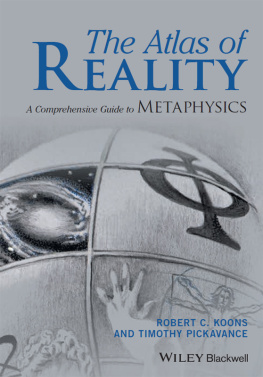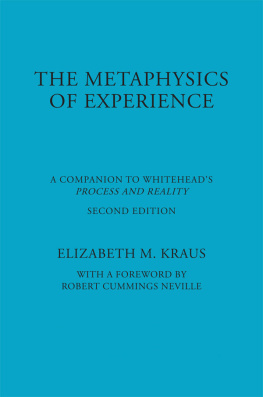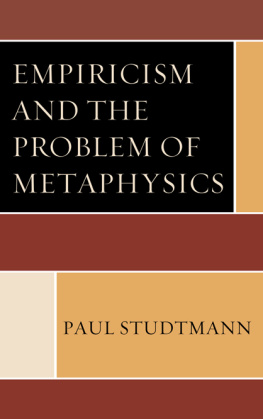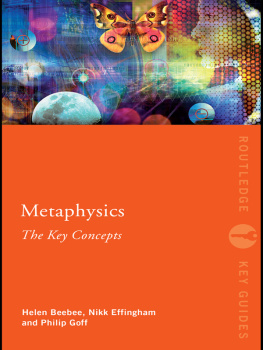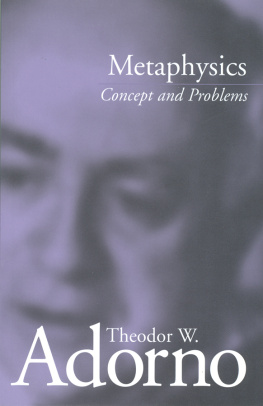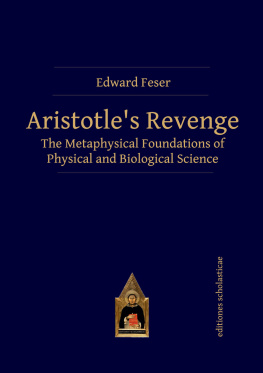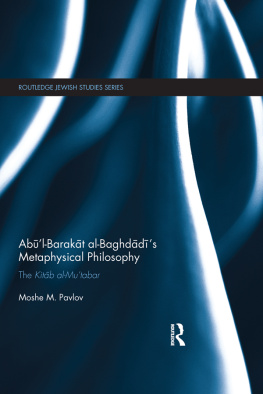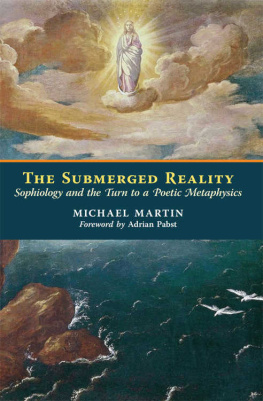
This edition first published 2017
2017 John Wiley & Sons, Ltd
Registered office
John Wiley & Sons, Ltd, The Atrium, Southern Gate, Chichester, West Sussex, PO19 8SQ, UK
Editorial Offices
350 Main Street, Malden, MA 02148-5020, USA
9600 Garsington Road, Oxford, OX4 2DQ, UK
The Atrium, Southern Gate, Chichester, West Sussex, PO19 8SQ, UK
For details of our global editorial offices, for customer services, and for information about how to apply for permission to reuse the copyright material in this book please see our website at www.wiley.com/wiley-blackwell.
The right of Robert C. Koons and Timothy H. Pickavance to be identified as the authors of this work has been asserted in accordance with the UK Copyright, Designs and Patents Act 1988.
All rights reserved. No part of this publication may be reproduced, stored in a retrieval system, or transmitted, in any form or by any means, electronic, mechanical, photocopying, recording or otherwise, except as permitted by the UK Copyright, Designs and Patents Act 1988, without the prior permission of the publisher.
Wiley also publishes its books in a variety of electronic formats. Some content that appears in print may not be available in electronic books.
Designations used by companies to distinguish their products are often claimed as trademarks. All brand names and product names used in this book are trade names, service marks, trademarks or registered trademarks of their respective owners. The publisher is not associated with any product or vendor mentioned in this book.
Limit of Liability/Disclaimer of Warranty: While the publisher and authors have used their best efforts in preparing this book, they make no representations or warranties with respect to the accuracy or completeness of the contents of this book and specifically disclaim any implied warranties of merchantability or fitness for a particular purpose. It is sold on the understanding that the publisher is not engaged in rendering professional services and neither the publisher nor the author shall be liable for damages arising herefrom. If professional advice or other expert assistance is required, the services of a competent professional should be sought.
Library of Congress Cataloging-in-Publication Data applied for.
Hardback ISBN: 9781119116127
A catalogue record for this book is available from the British Library.
Cover image: Atlas of Reality, graphite and ink drawing (2016), Tim High, www.timhigh.com
To our children, Emily, Betsy, and Ben Koons, and Lyle and Gretchen Pickavance.
Acknowledgements
We would like to thank our commissioning editor at Wiley-Blackwell, Deirdre Ilkson, our project editors, Roshna Mohan and Manish Luthra, and four anonymous reviewers. We would also like to thank Al Martinich, who got us started on this project by inviting us to contribute to the Fundamentals of Philosophy series. Our special thanks to Benjamin Koons for his help in proofreading the manuscript. We are grateful to Peter Forrest, L. A. Paul, Daniel Korman, Josh Parson, Graham Priest, and Trenton Merricks for comments on an early draft, Alexander Pruss and Josh Rasmussen for their help on causation and composition, and Robert Garcia for his insights on tropes and constituent ontology.
We have both benefited greatly from the assistance of our students, including the students of eight sections of PHL 323K and 327 at the University of Texas from 2010 through 2015. Graduate students at both the University of Texas and Biola University have contributed much to this project, including Bryan Pickel, Nicholas Mantegani, Brian Cutter, Nora Berenstain, Richard Lawton Davis, Nicole Garcia, Trevor Nyman, Kate Ritchie, Travis Hobbs, Briggs Wright, Janice Chik, Matthew M. O'Brien, and Max Goss.
RCK adds: I would like to acknowledge the support during the 2014-2015 academic year of the James Madison Program in American Ideals and Institutions at Princeton University (for a Visiting Fellowship) and the University of Texas at Austin (for a faculty research grant).
THP adds: I would like to thank Scott Rae and Clint Arnold, as well as the administration at Biola University, for a Sabbatical during the Fall of 2015.
Part I
Foundations
Introduction
Metaphysics, or first philosophy, is that branch of philosophy concerned with the nature of reality in its most fundamental aspects: existence, the part/whole relation, space, time, causality, possibility and necessity, similarity and dissimilarity. It includes ontology, the study of what exists, as well as the investigation of the most general features of reality. Metaphysicians seek to understand the real structure and the unity of the world and to catalog the ways in which its parts relate to each other.
In this chapter, we begin with a short history of metaphysics (1.1), followed by a discussion of some reasons why metaphysics matters (1.2). We conclude with some guidance about how best to use this book (1.3).
1.1 A Brief History of Metaphysics
Metaphysics is the oldest branch of philosophy. The early, pre-Socratic philosophers of Ionia (off the coast of Turkey) and southern Italy proposed theories about the universal nature of things and about change and the explanations of change. Many of the early philosophers, including Empedocles (c. 490430 BC) and Democritus (c. 460370 BC), approached these questions from a materialistic point of view, assuming that wisdom comes primarily from understanding what things are made of. In the fourth century BC, the great Greek philosopher Plato (428/427 or 424/423348/347 BC) developed a theory of forms as a deep explanation for what makes things of a kind similar to each other, as an alternative to the earlier materialism. Plato's student, Aristotle (384322 BC), built upon the work of all of his predecessors in creating the first comprehensive and systematic metaphysical theory in a work that acquired (for the first time) the title Metaphysics. Aristotle describes his subject as primary or first philosophy and as the study of being as such. Aristotle examined the nature of change and of powers to change, and he built a theory of categories to use in classifying all of the constituents of reality. Like Plato, Aristotle rejected simple materialism and emphasized the qualitative and holistic features of the world, especially of living organisms.
Both Plato and Aristotle founded schools of philosophy, and their students and their students' students extended their philosophical work over many generations. During the Hellenistic period (between the conquests of Alexander and the rise of Rome), three additional major schools of philosophy appearedthe Stoics, the Epicureans, and the Skeptics. Both the Stoics and Epicureans revived a more materialistic approach to understanding life and human action. During the Hellenistic and Roman periods, such metaphysical investigations continued, but gradually attention turned to ethics, politics, and the theory of knowledge (epistemology). The problem of defending the very possibility of knowledge against the challenge of the Skeptics became a major preoccupation, and Plato's Academy began to defend (at least in public) a moderate form of skepticism.
In Late Antiquity and the Middle Ages, philosophical work in the Mediterranean basin and in Europe fell predominantly into the hands of Christians, Jews, and Muslims, and during this period philosophers returned to metaphysics as their central focus. Aristotle's influence grew, as more of his work was translated and commented upon in both Arabic and Latin. The resulting philosophical movement, known as scholasticism, achieved the status of being the consensus view for many hundreds of years.
Next page
